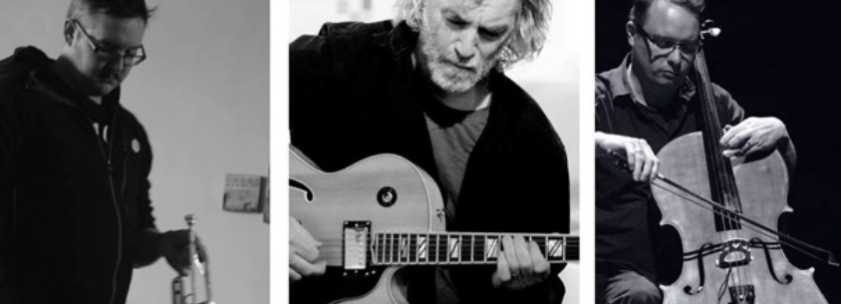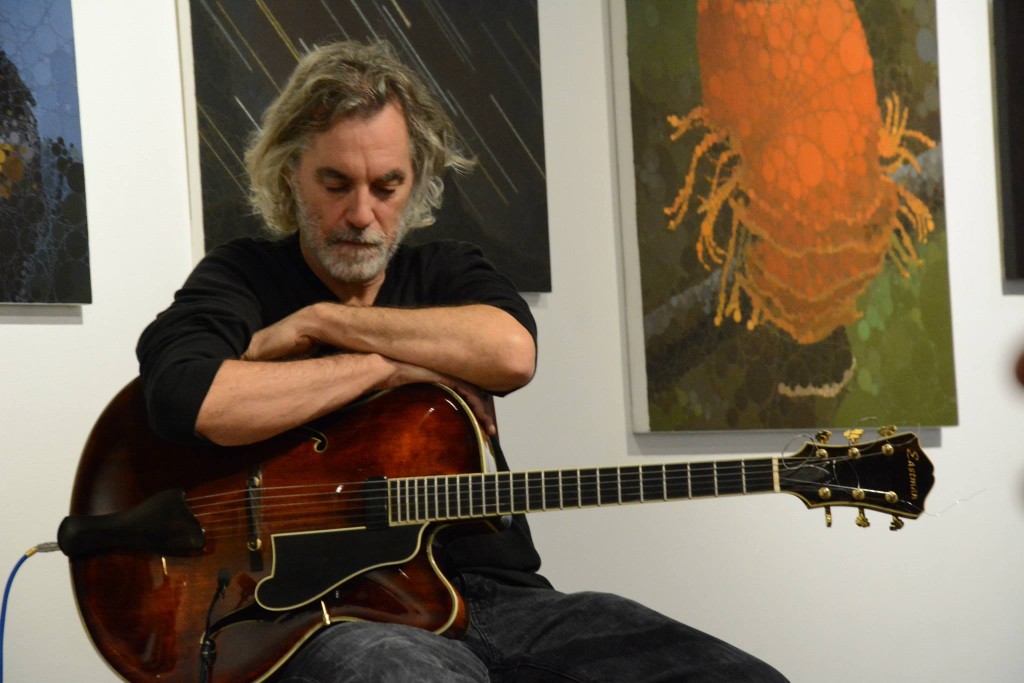Joe Morris, Craig Pedersen & Mark Molnar @ Black Squirrel Books, Feb. 26

Black Squirrel Books will be hosting a night of improvisational music this Thursday featuring a trinity of powers that will come together for the first time ever.
Minister of Ambient Replenishment at Black Bough Records and experimental cellist Mark Molnar from the Outaouais will join Montreal’s trumpet pundit Craig Pedersen and music revolutionary Joe Morris from Connecticut on their second day of a five-day tour through Ontario to Montreal. Trumpet player and cellist have collaborated before but never with free musician Joe Morris, a guitarist for more than 40 years, who is known in the jazz and improv community as an incredibly powerful and imaginative virtuoso.
Molnar urged me to talk to Morris about the show and his thoughts on music in general. In a 20-minute conversation I had with him on Sunday, I found that much of what I’d read about Joe Morris was not exaggerated.
“Most of what I do is completely improvised. That might sound like it’s a lack of preparation or that it’s easier but it takes an enormous effort to liberate myself from composition,” he said. “Those of us who play free music have to make up a framework of rules as we go. By building up a large amount of technique we can put on a performance that requires a lot skill and knowledge, a lot of imagination and daring.”
Despite his long career as a professional musician, Morris actively abandons all pre-determined ideas of what to expect from his musical associates. The issue is to just get together and make interesting music. “I don’t know Mark,” he said, “I just know he’s an incredible musician.” Molnar equally considers Morris to be a tremendous talent and a productive collaborator.
Morris is also a teacher in the jazz and improvisation department at the New England Conservatory of Music in Boston. In a nutshell, he teaches his students how to decipher what is happening between instruments to make it sound like music. He feels the conversation around improvisation is more about philosophy and less about music these days. What he has tried as a teacher is illuminate the essential properties that everyone employs when they improvise, to help young artists develop their skills, understanding and creativity.
“I think it’s good when people are open-minded about music. We should just expand our understanding of it. There isn’t any right way to do it, only each artists’ way to accomplish the goals they have. Free music might sound very chaotic, or very dense, or noisy, and it might sound lush and beautiful, because that’s what happens.”
Craig Pedersen is the co-founder of the Improvising Musicians of Ottawa/Outaouais association (IMOO), and Morris met him at the 2013 Ottawa Jazz Festival. They stayed in touch, with Pedersen sending him his new music as he recorded it. According to Morris, Pedersen’s technique is up there with the absolute best trumpetists today and he was honoured to be asked to play with him and Molnar. Pedersen recently published a book on extended trumpet technique called Trumpet Sound Effects with Berklee Press in November 2014. He will be giving a lecture based on the book in Montreal at the Festival of New Trumpet Music Canada on March 15.
Morris has also written a book on his craft. Perpetual Frontier: The Properties of Free Music was written to help improvisational musicians learn to create their methodologies. Four seminal methodologies in improvisational music known as Unit Structures, Harmolodics, Tri-Axium Theory, and European Free Improvisation are all exemplified in this book. It’s also an insight for music fans who wish to know more about the history and use of improvisational music.
The show starts at 7:30 p.m. on Thursday, and will feature another improvising trio opening: David Broscoe, Ian Birse & Laura Kavanaugh. All musicians from the region, they are part of the IMOO and all actively playing their brand of experimental off-the-cuff. To Morris, there could nothing better than young artists pushing themselves.
“That someone like me is invited to play,” he said, “to be able to encourage them to play, or to hire them to play, or to organize something that they can play on… It means I’m perpetuating the whole thing, that I’m keeping it going. It means that they see that we’re working off of the same premise, off of the same necessity. That deserves respect.”

